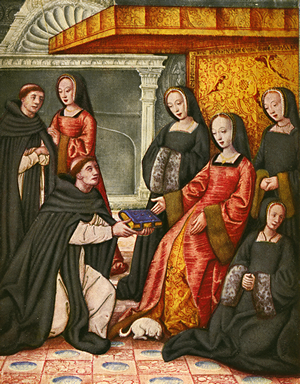Brittany is a region of north-west France which has always regarded its culture remote from
that of the rest of the country; and in support of this ideology there is an
historical story of a seemingly vulnerable Duchess. 
Her
story revolves around her three marriages; which came about in her endeavours
to secure the continuing independence of the Duchy. For Anne it all began in
1488 when a French army invaded Brittany defeating Anne’s Father; Frances II Duke of Brittany, and effectively ending what was referred to as La Guerre Folle between France and the Duchy. France coveted Brittany, and fearing it would fall into foreign hands
imposed on the Duke the restriction that his daughter’s hand in marriage would
not be given without the consent of the French crown. Shortly afterwards the
Duke died leaving Anne; at the tender age of twelve, Duchess of Brittany and facing what was to be, the last Franco-
Breton war.
The
responsibility of guarding the autonomy of this region was now lay on the
shoulders of a young girl. In 1490 there seemed an obvious solution; marriage
to a non French King. There was no shortage of suitors as Brittany was regarded as a worthy prize, from Edward Prince
of Wales; the son of Edward IV of England, to the already married Louis, Duke of
Orleans. But it was the recently widowed
Maximilian of Austria of the Habsburg family who was regarded as the most
suitable and through this marriage the prestigious title of Queen of the Romans would be bestowed on
Anne. A marriage by proxy was arranged at
Rennes but this proved a step too far for the French and
their King.
The
Brittany Duchess had broken the treaty agreed between her Father and the King
of France; a direct insult to Charles VIII, and to rub salt in the wound, the
alliance would place the region under the rule of his enemy.
In
1491 Rennes was put under siege by CharlesVIII army and
although Maximilian was too occupied in Hungry to come to Anne’s aid, help was
tentatively provided by Castile and England. Unfortunately for Anne, both countries wanted to
avoid war with France and their limited provision of soldiers was
ineffective in preventing Charles winning the battle. Although the people of Rennes gallantly defended their city, Anne conceded defeat
and was compelled to marry the King; thus securing Brittany as part of France.
Despite
protests from Maximilian the marriage was annulled and Anne was crowned Queen
of France on the 8th February 1492. It was not a happy marriage and they often lived
separately and sadly none of their four children survived infancy. However,
during the marriage some agreements were made between the two sovereigns that
would ensure privileges for Brittany. Among them was the right to pay only taxes
consented to by the assembly of estates and the other bequeathed the
sovereignty of Brittany to the surviving monarch.
Another
agreement however obliged Anne to marry Charles’s successor. Unexpectedly in
1498 Anne was widowed, when after a game of ‘jeu de paume’ (court tennis) Charles hit his head on the lintel of
a door and died a few hours later. Anne was only 21 years old and the new king,
Louis XII, was already married, to the sister of her deceased husband. The
solution was provided by the Pope who dissolved Louis’s first alliance leaving
the way clear for Anne’s third wedding celebration. On the 8th
January 1499 Anne set a
precedent by walking down the aisle in white gown.
Louis,
was a much more obliging husband and respecting his wife’s devotion to her
beloved Bretagne he recognised her entitlement to be Duchess of
Brittany; accepting gracefully, the title of duke consort.
Until her death in 1514 Duchess Anne,
jealously guarded the autonomy of Brittany. She died from a kidney stone at Chateau Blois and there followed a funeral that lasted forty
days. Anne was buried in the Necropolis
of Saint Denis but she had requested her heart be placed in an enamel gold
reliquary and deposited in the vault of the Carmelites at Nantes; the tomb of her parents.
It is because of Anne; Duchess of Brittany and
her devotion to safeguarding the independence of Brittany, that today there are privileges accorded to this
region; and to no other. One of which you have probably benefited from if you
drive a car in this region; for you will have discovered you are not required
to pay a toll on any road. Another reminder that this little corner of France is different to the rest of the country is the
place names displayed in Breton (or is it Welsh?) Either way, it’s all due to ‘Anne de Bretagne’.
Recent Comments